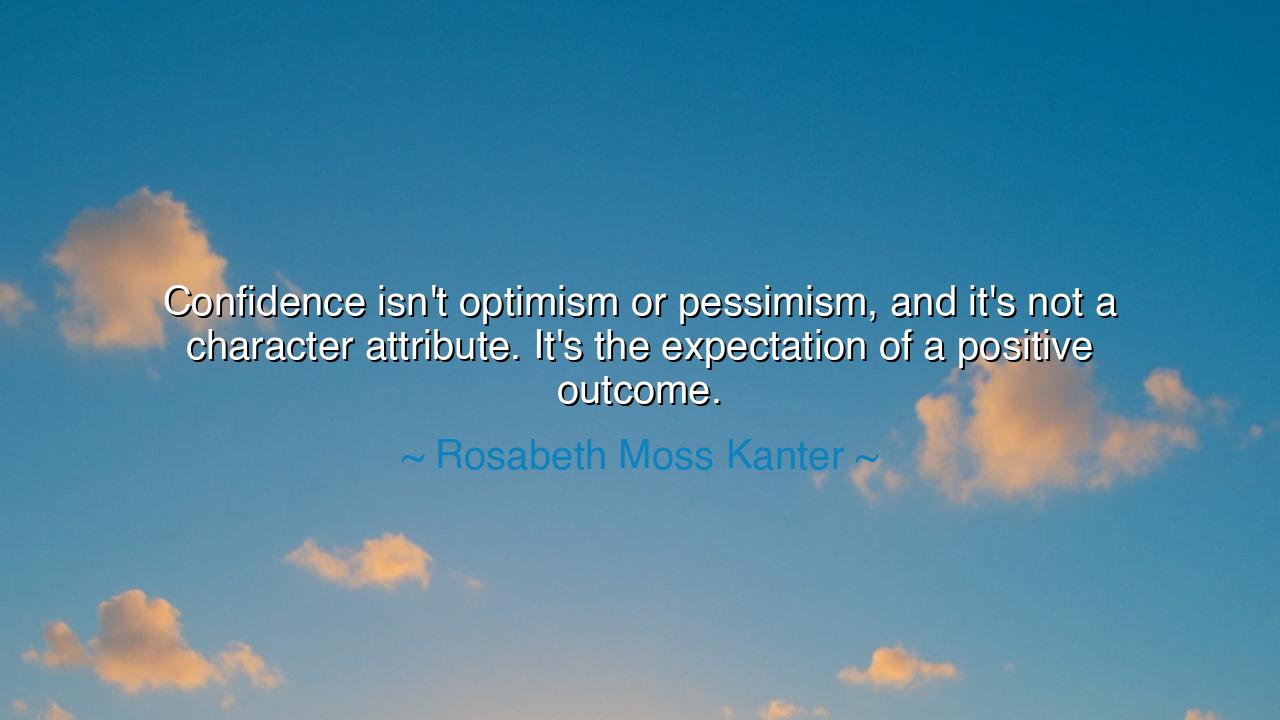
Confidence isn't optimism or pessimism, and it's not a character
Confidence isn't optimism or pessimism, and it's not a character attribute. It's the expectation of a positive outcome.






When Rosabeth Moss Kanter declared, “Confidence isn't optimism or pessimism, and it's not a character attribute. It's the expectation of a positive outcome,” she unveiled a truth that pierces to the core of human endeavor. Her words remind us that confidence is not a fleeting mood or a mere trait bestowed at birth, but a disciplined belief, cultivated and chosen, that tomorrow can bring victory. To expect a positive outcome is not blind hope nor naïve cheer, but the steady resolve that effort, courage, and persistence will not be in vain.
The ancients knew this wisdom well. The Greeks spoke of thumos, the spirited force that drove warriors to battle and thinkers to truth. This was not optimism, for the battlefield was filled with death; nor was it pessimism, for despair crushes the will to act. It was the fire of expectation — the belief that one’s actions could carve destiny from chaos. Kanter’s teaching is the heir of this tradition: that confidence is born not of illusion, but of the conviction that purposeful action brings fruit.
History bears luminous witness. Consider Thomas Edison, who failed thousands of times before creating the electric light. When asked if these failures discouraged him, he replied that each attempt was not a failure but a step closer to success. This was not blind optimism, nor stubborn denial. It was confidence — the expectation that perseverance would bring about the desired outcome. His light still burns in our world today, proof of the power Kanter describes.
Kanter’s wisdom also cuts away falsehood. Many think confidence is swagger, bravado, or arrogance — a mask of strength. Others believe it is innate, a gift that some are born with and others lack. But she teaches us that it is neither of these. True confidence is not a mask, but a mindset; not an accident of birth, but a discipline of belief. It is accessible to all who choose to expect that their efforts matter, that their labor can shape tomorrow.
At the heart of her teaching lies the transformation of fear into courage. To expect a positive outcome does not mean denying obstacles; it means refusing to be paralyzed by them. The mountain remains tall, the storm still rages, but the confident soul presses forward, believing that the summit can be reached, the storm endured. This expectation fuels persistence, and persistence turns the improbable into the inevitable.
The lesson is clear: cultivate confidence not by pretending all is easy, but by training your mind to expect growth, progress, and triumph through effort. When setbacks come, do not surrender to pessimism, nor hide behind hollow optimism. Instead, remind yourself that each step forward, each attempt, brings you closer to victory. It is this expectation that keeps the weary moving and turns trials into triumphs.
In practice, this means building habits of belief. Begin each task with a vision of its completion, no matter how distant. Speak to yourself not in words of doubt, but in words of expectation: “This can be done, and I will find the way.” Surround yourself with companions who remind you of what is possible. And when failure comes, as it always will, do not call it the end — call it a step in the journey toward the positive outcome you still expect.
Therefore, let us carry the wisdom of Rosabeth Moss Kanter: confidence is not optimism, nor pessimism, nor mere character — it is the disciplined expectation of a positive outcome. Cultivate it, guard it, live by it. For the world belongs not to those who drift between despair and shallow hope, but to those who expect that their hands, their minds, and their hearts can shape a brighter tomorrow.






GDGold D.dragon
I find it fascinating that confidence is framed as expectation rather than character. It raises the question of how self-fulfilling this expectation might be—does expecting a positive outcome actually increase the likelihood of success? Conversely, could overconfidence be a misalignment of expectation and reality? I’m also curious about how this concept applies in high-stakes environments like business or sports. Can structured preparation and mindset techniques reliably build confidence under pressure?
HAHoai An
This perspective makes me reconsider how I evaluate confidence in others. If it’s about expecting positive outcomes rather than optimism or personality, then confidence might be more observable through decision-making and actions than through emotions. I also wonder how cultural factors influence expectations of outcomes—do societies that emphasize risk aversion or uncertainty affect the way confidence is expressed? How might this definition help leaders or educators nurture confidence more effectively in their teams or students?
DNDuy Nguyen
Reading this, I’m struck by the idea that confidence is more about anticipation than feeling. Does this mean that even someone who experiences fear or doubt can still exhibit confidence if they expect a positive result? I also wonder how this interacts with failure—if the outcome isn’t positive, does it undermine confidence or simply adjust expectations? It raises deeper questions about whether confidence is a skill that can be systematically developed rather than an innate trait.
THHoang Thanh Hang
This definition of confidence is intriguing because it separates it from personality traits or emotional states. I wonder how this expectation of positive outcomes is cultivated—through experience, preparation, or mindset training? It also makes me question how confidence differs across contexts. Can someone be confident in one area of life but not another, and does this suggest confidence is situational rather than inherent? How might this perspective change the way we approach personal growth and risk-taking?